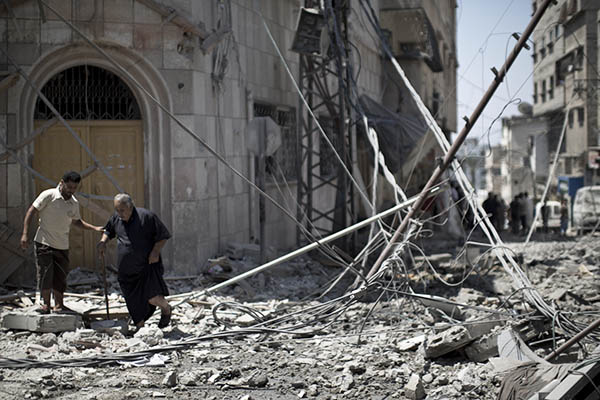
Mahmud Hams—AFP
U.N. official says decade of Hamas rule, ongoing Israeli blockade responsible for deteriorating conditions in Palestinian territory
The Gaza Strip may already be “unlivable,” a United Nations official warned on Tuesday, after a decade of Hamas rule and a crippling Israeli blockade.
Robert Piper, the U.N.’s top humanitarian official in the Palestinian territories, told AFP in an interview to mark the launch of a report on living conditions in Gaza that all indicators “are going in the wrong direction.”
“We predicted some years ago that Gaza would fast become unlivable on a host of indicators and that deadline is actually approaching even faster than we predicted—from health access, to energy to water,” he said. A 2012 U.N. report predicted the Palestinian enclave would be “unlivable” by 2020 if nothing was done to ease the blockade.
Piper said Gaza’s power supply was down to as little as two hours a day, medical care had been slashed and youth unemployment was over 60 percent. “For most of us that unlivability point has already been passed,” he said. “And yet somehow the Gazans soldier on.”
The new U.N. report, “Gaza—Ten Years Later,” says more than 95 percent of Gaza’s water is now unfit for drinking.
The Islamist Palestinian movement Hamas seized Gaza from secular Palestinian president Mahmud Abbas’s forces in June 2007, leading Israel to impose a crippling blockade which critics say indiscriminately punishes Gaza’s two million residents. The Gaza, wedged between Israel, Egypt and the eastern Mediterranean, is barely 40 kilometers long and 10 kilometers wide.
Since 2013 Egypt, the only other country with which Gaza shares a border, has largely closed its crossing and destroyed hundreds of smuggling tunnels that provided a vital economic lifeline whilst also allegedly being used by Hamas to bring in weapons. Hamas has fought three wars with Israel since 2008, the most recent in 2014.
Gaza, one of the most densely populated places in the world, has suffered massive destruction in each of the conflicts.
Israel’s ambassador to the U.N., Danny Danon, said the U.N. report showed that “Hamas has brought nothing but pain and destruction to the residents of Gaza.”
“The continued exploitation of humanitarian aid by this terrorist organization harms Palestinian civilians and sabotages the efforts of the international community,” he said. Danon urged the U.N. to push “the Palestinian leadership [to] abandon its support of incitement and terror.”
But the Palestinian Authority, which runs the internationally recognized government in the West Bank, is making its own efforts to squeeze Hamas, reducing energy funding and allegedly cutting the number of travel permits issued to sick Gazans seeking medical treatment outside the territory.
Critics say this has led to yet more suffering.
After being expelled by Hamas in 2007, the PA continued to pay the salaries of more than 40,000 employees who are not actually working. The PA has sought to reduce their salaries in recent months, while forcibly retiring others.
A recent poll found 88 percent of Palestinians opposed the move, which analysts say is designed to pressure Hamas by creating tension in Gaza.
Piper said the PA’s objective of ending the split between Palestinian factions was “legitimate” but warned that some measures were indiscriminate. He said cuts to the salaries of employees who were not working are “arguably a legitimate means of putting some pressure on the de facto authorities in Gaza.” But he said other measures “are much less palatable,” including energy cuts and cutting the number of healthcare travel permits issued.
“The Palestinian Authority has been taking certain measures to at least slow access to proper health care,” he said. “These sorts of measures for us are not acceptable.”
